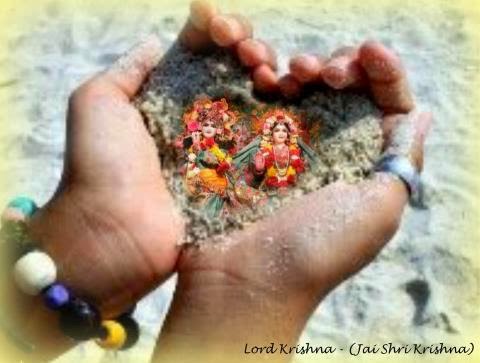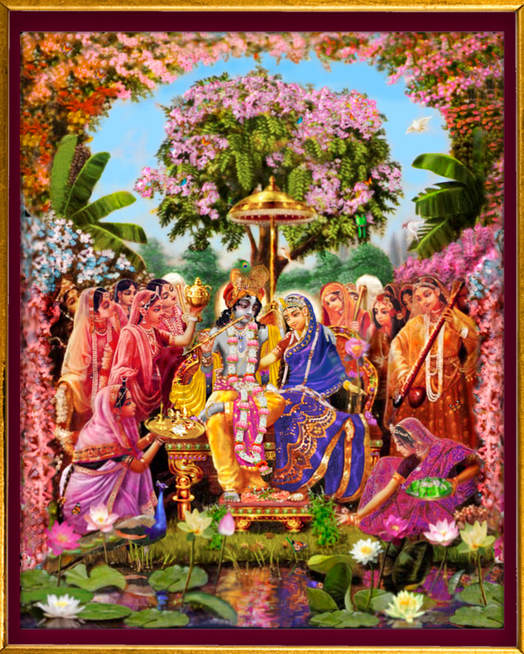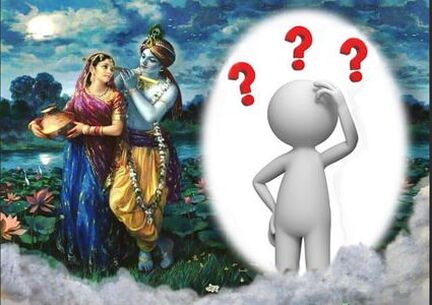|
All living beings constantly perform various actions with the inevitable aim of attaining unsurpassed, ever-increasing and everlasting bliss. However, despite a tremendous amount of efforts to attain this bliss, it still eludes us. Why? Simply because, we are ignorant about what true happiness is. Also we are unaware of how we can achieve it.
The Vedas define bliss as: यो वै भूमा तत्सुखम् ।
yo vai bhūmā tatsukham । |
“That which is eternal and unlimited is called bliss”. True bliss can never be over-powered by unhappiness, discontentment or sorrow.
The Vedas also say:
The Vedas also say:
आनंदो ब्रह्मेति व्यजानात् ।
ānando brahmeti vyajānāt ।
ānando brahmeti vyajānāt ।
“God is bliss”. Take note of this statement; the statement does not say that “there is Bliss in God”. This hymn states - God "is" Bliss. Let’s use an example to understand this concept - a general expression is, “there is a very large volume of water in the ocean”. However, that is not entirely true. The phrase “very large volume of water” is synonymous with “Ocean” and vice-versa. Similarly, the incessant quest for attaining “happiness” is same as the quest for attaining “God”.
Our senses can perceive the material world. Due to ignorance that "only what we can perceive is real", we continue to search for happiness in material objects (living and non-living). The Sankhya school of philosophy says:
Our senses can perceive the material world. Due to ignorance that "only what we can perceive is real", we continue to search for happiness in material objects (living and non-living). The Sankhya school of philosophy says:
त्रिविध दुःखात्यन्तनिवृत्तिरत्यन्त पुरुषार्थः ।
नकुत्रापि कोऽपि सुखी तदपि दुःखशबलामिति दुःखपक्षे निःक्षिपन्ते विवेचकाः ॥
trividha duḥkhātyantanivṛttiratyanta puruṣārthaḥ ।
nakutrāpi ko'pi sukhī tadapi duḥkhaśabalāmiti duḥkhapakṣe niḥkṣipante vivecakāḥ ॥
नकुत्रापि कोऽपि सुखी तदपि दुःखशबलामिति दुःखपक्षे निःक्षिपन्ते विवेचकाः ॥
trividha duḥkhātyantanivṛttiratyanta puruṣārthaḥ ।
nakutrāpi ko'pi sukhī tadapi duḥkhaśabalāmiti duḥkhapakṣe niḥkṣipante vivecakāḥ ॥
“There is no trace of happiness in the material world and if there seems to be a shadow of happiness, then that is also transient and eventually results in misery.” Since God is divine He cannot be perceived with our senses. Hence, we don’t pursue God . Instead we desire for countless objects in anticipation of getting bliss. It is our personal experience that upon obtaining material objects we relish them and feel happier, but then the joy continues to diminish and eventually ends. Then we pursue other objects and thus the search goes on. Also, these objects are perishable in nature and even while they exist, there exists something which is better and more desirable.
Since desire for lasting “bliss” is universal, Saint Tulsidas Ji proclaims,
Since desire for lasting “bliss” is universal, Saint Tulsidas Ji proclaims,
अस को जीव जन्तु जग माहीं, जेहि रघुनाथ प्राण प्रिय नाहीं ॥
asa ko jīva jantu jaga māhīṃ, jehi raghunātha prāṇa priya nāhīṃ ॥
asa ko jīva jantu jaga māhīṃ, jehi raghunātha prāṇa priya nāhīṃ ॥
 What will we do after God-Realization?
What will we do after God-Realization?
“For every living being Lord Ram is dearer than life” (see Everyone is a Believer).
We continue to perform diverse actions, even conflicting actions (sleeping and waking up, standing and sitting etc), with the sole purpose of attaining “happiness”. Since we cannot give up our quest for happiness, it is imperative to attain true knowledge so that we put our efforts in the right direction.
Many people innocently ask, “What will we do after attaining unlimited bliss?” Currently, we are engaged in the constant quest for attaining “bliss”, which motivates us to continue performing a variety of actions, with not a single moment to spare. Once we attain that happiness, let’s assume within this lifetime, we would have nothing to do after that during this lifetime. Thereafter, after leaving this body, once the soul goes to Golok, what will we do there? Since there would be no unfulfilled motive, there would be no reason to perform any action. What will the soul do all day and all night for the rest of eternity? Perhaps their concern is that after God-realization, our life will become very monotonous and boring!
Let us try to answer this question, from the knowledge described in our ancient scriptures, and see what the scriptures say about the life after God-realization.
Scriptures say those under the control of Maya cannot understand anything about the divine realm. Since a mind is controlled by intellect and intellect is controlled by Maya which is in turn controlled by God. Just like a bulb does not know its source of energy a material mind cannot know its source, which is God. Still since the question has been asked, we will tell what the scriptures say about the life after God-realization. the real experience can be had only after God-realization.
A God realized soul forever remains in the ecstasy of divine love bliss. However, by the inspiration of God and equipped with the divine power of Yogmaya, a saint controls his ecstatic condition and is seen performing actions to keep his body healthy in order to help and serve material beings. At the same time, he also remains in Golok and continues to enjoy the divine association and pastimes of God. Dhruv, Prahlad, Ambareesh etc. and many other saints are examples of God-realized saints who led normal human lives while enjoying the bliss of God.
God realization happens ONLY AFTER the soul surrenders his body, mind, intellect and soul to the will of God. The mind weighs the options, the intellect makes a decision and the mind directs the senses to perform the actions determined by the intellect. If the mind and intellect are completely surrendered to God, then the complete apparatus of thinking and making decisions is controlled by God, hence the individual soul does not perform any action. If the soul appears to be performing actions, then those actions are performed by God. In other words the soul becomes a tool in the hands of God. Having overthrown the yoke of Maya the soul no longer desires for any material pleasures. Its only desire is to please God and it is overjoyed to fulfill God's wishes.
God is eternally omniscient and blissful. The soul is also eternal. Upon God-realization, by the grace of God, the soul becomes omniscient and blissful. That’s why Tulsidas Ji says:
We continue to perform diverse actions, even conflicting actions (sleeping and waking up, standing and sitting etc), with the sole purpose of attaining “happiness”. Since we cannot give up our quest for happiness, it is imperative to attain true knowledge so that we put our efforts in the right direction.
Many people innocently ask, “What will we do after attaining unlimited bliss?” Currently, we are engaged in the constant quest for attaining “bliss”, which motivates us to continue performing a variety of actions, with not a single moment to spare. Once we attain that happiness, let’s assume within this lifetime, we would have nothing to do after that during this lifetime. Thereafter, after leaving this body, once the soul goes to Golok, what will we do there? Since there would be no unfulfilled motive, there would be no reason to perform any action. What will the soul do all day and all night for the rest of eternity? Perhaps their concern is that after God-realization, our life will become very monotonous and boring!
Let us try to answer this question, from the knowledge described in our ancient scriptures, and see what the scriptures say about the life after God-realization.
Scriptures say those under the control of Maya cannot understand anything about the divine realm. Since a mind is controlled by intellect and intellect is controlled by Maya which is in turn controlled by God. Just like a bulb does not know its source of energy a material mind cannot know its source, which is God. Still since the question has been asked, we will tell what the scriptures say about the life after God-realization. the real experience can be had only after God-realization.
A God realized soul forever remains in the ecstasy of divine love bliss. However, by the inspiration of God and equipped with the divine power of Yogmaya, a saint controls his ecstatic condition and is seen performing actions to keep his body healthy in order to help and serve material beings. At the same time, he also remains in Golok and continues to enjoy the divine association and pastimes of God. Dhruv, Prahlad, Ambareesh etc. and many other saints are examples of God-realized saints who led normal human lives while enjoying the bliss of God.
God realization happens ONLY AFTER the soul surrenders his body, mind, intellect and soul to the will of God. The mind weighs the options, the intellect makes a decision and the mind directs the senses to perform the actions determined by the intellect. If the mind and intellect are completely surrendered to God, then the complete apparatus of thinking and making decisions is controlled by God, hence the individual soul does not perform any action. If the soul appears to be performing actions, then those actions are performed by God. In other words the soul becomes a tool in the hands of God. Having overthrown the yoke of Maya the soul no longer desires for any material pleasures. Its only desire is to please God and it is overjoyed to fulfill God's wishes.
God is eternally omniscient and blissful. The soul is also eternal. Upon God-realization, by the grace of God, the soul becomes omniscient and blissful. That’s why Tulsidas Ji says:
जानत तुमहिं तुमहिं ह्वै जाई ।
jānata tumahiṃ hvai jāī ।
jānata tumahiṃ hvai jāī ।
 In Golok i.e. space, air, fire, water and land are Shri Krishna himself
In Golok i.e. space, air, fire, water and land are Shri Krishna himself
“One who knows God becomes equivalent to God”.
Upon God-realization, the individual soul attains a divine body, divine senses, divine mind and divine intellect. With those divine faculties, the soul continues to enjoy divine bliss; endlessly. Upon God realization, the intellect, mind and senses of the soul become divine. It is with these divine senses that a soul is able to perceive the original divine form of God, hear his divine words and experience His divine bliss. Maya no longer has any control over the soul; the soul doesn’t experience any pain or suffering e.g. anger, greed, jealousy, or worrying (see panchklesh, panchkosh).
In Golok, Maya and material things cannot enter. All entities in Golok i.e. space, air, fire, water and land are Shri Krishna himself. When this soul leaves the material body, it is given a divine body with which it enters Golok. These divine bodies don't suffer from any afflictions like old age, ill health, fatigue, death, excretion etc.
Additionally, just like God, the soul also becomes satya-sankalp whatever he resolves, that happens without having to work for it. Moreover, the most potent and intimate Divine power of God - Yogmaya, takes care of each and every need of these saints.
In Gita Shri Krishna says
Upon God-realization, the individual soul attains a divine body, divine senses, divine mind and divine intellect. With those divine faculties, the soul continues to enjoy divine bliss; endlessly. Upon God realization, the intellect, mind and senses of the soul become divine. It is with these divine senses that a soul is able to perceive the original divine form of God, hear his divine words and experience His divine bliss. Maya no longer has any control over the soul; the soul doesn’t experience any pain or suffering e.g. anger, greed, jealousy, or worrying (see panchklesh, panchkosh).
In Golok, Maya and material things cannot enter. All entities in Golok i.e. space, air, fire, water and land are Shri Krishna himself. When this soul leaves the material body, it is given a divine body with which it enters Golok. These divine bodies don't suffer from any afflictions like old age, ill health, fatigue, death, excretion etc.
Additionally, just like God, the soul also becomes satya-sankalp whatever he resolves, that happens without having to work for it. Moreover, the most potent and intimate Divine power of God - Yogmaya, takes care of each and every need of these saints.
In Gita Shri Krishna says
ये यथा मां प्रपद्यन्ते तांस्तथैव भजाम्यहम्।
ye yathā māṃ prapadyante tāṃstathaiva bhajāmyaham।
ye yathā māṃ prapadyante tāṃstathaiva bhajāmyaham।
“I reciprocate the feelings and intensity of love of My devotees”. In fact, these souls strive to please the Divine Couple, and Shri Radha Krishna in turn magnify the bliss, many times over, and return it back to the saint.
Chaitanya Mahaprabhu says
Chaitanya Mahaprabhu says
जीवेर स्वरूप होय कृष्णेर नित्य दास ।
jīvera svarūpa hoya kṛṣṇera nitya dāsa ।
jīvera svarūpa hoya kṛṣṇera nitya dāsa ।
 Shri Radha Krishna constantly play ever new divine pastimes
Shri Radha Krishna constantly play ever new divine pastimes
"Every soul is an eternal servant of God" which means every soul ought to serve God alone. Each part exists to serve the whole for example, a tree has multiple parts. However, the one and only purpose of each and every part of the tree - the trunk, stem, branches and leaves is to serve the tree. Similarly, every soul is an inseparable part of God. After God-realization the soul attains his innate right to serve God. Being a part of God, it is the natural desire of all living beings and it is the highest bliss that the individual experiences.
The soul also gets a permanent residence in Golok wherein Shri Radha Krishna constantly play ever new divine pastimes. These fortunate devotees participate in those pastimes. The immense joy experienced through this is unfathomable and inexplicable.
After ascending to Golok, sometimes, by the inspiration of God these saints descend back on this Earth, with the sole aim of leading material beings towards the path of everlasting bliss. Even while interacting with material beings, they remain forever absorbed in the divine bliss in Golok.God-realized souls enjoy the ever new nectar of divine names, forms, pastimes, attributes, abodes etc. of the divine couple Shri Radha Krishna eternally and never have a moment to spare to get bored. Their joy also keeps on increasing every moment.
In Golok, the life of the devotee is full of divine ecstasy. There is no pain or suffering. But, since we have no idea of divine bliss, we cannot imagine the life of those who dwell in Golok. But we must accept the word of the Vedas and the Saints and try to strive for the Divine bliss.
The soul also gets a permanent residence in Golok wherein Shri Radha Krishna constantly play ever new divine pastimes. These fortunate devotees participate in those pastimes. The immense joy experienced through this is unfathomable and inexplicable.
After ascending to Golok, sometimes, by the inspiration of God these saints descend back on this Earth, with the sole aim of leading material beings towards the path of everlasting bliss. Even while interacting with material beings, they remain forever absorbed in the divine bliss in Golok.God-realized souls enjoy the ever new nectar of divine names, forms, pastimes, attributes, abodes etc. of the divine couple Shri Radha Krishna eternally and never have a moment to spare to get bored. Their joy also keeps on increasing every moment.
In Golok, the life of the devotee is full of divine ecstasy. There is no pain or suffering. But, since we have no idea of divine bliss, we cannot imagine the life of those who dwell in Golok. But we must accept the word of the Vedas and the Saints and try to strive for the Divine bliss.
उसकी प्रेर्णा से इन्द्रिय मन बुद्धि अपना-अपना कार्य करने में समर्थ होते हैं अतएव प्रेर्य इन्द्रिय मन बुद्धि अपने प्रेरक ईश्वर कि ग्रहण करने में असमर्थ हैं ।
It is through inspiration from God, that the senses, mind and intellect perform their respective functions. Thus the inspired senses, mind and intellect are incapable of grasping their Inspirer, God.
- Jagadguru Shri Kripalu Ji Maharaj
It is through inspiration from God, that the senses, mind and intellect perform their respective functions. Thus the inspired senses, mind and intellect are incapable of grasping their Inspirer, God.
- Jagadguru Shri Kripalu Ji Maharaj
Love our Publications!!
|
<-- Read Previous Divya Ras Bindu
|
To receive this publication monthly please subscribe by entering the information below
|



